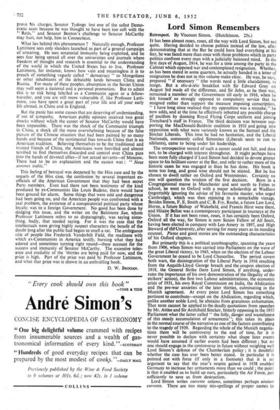American Spy Panic
Ordeal By Slander. By Owen Lattimore. MacGibbon & Kee. 13s. 6d.) ONE of the great differences between the atmosphere of Britain in the two wars was the comparative absence of conspiratorial mania in the second war. There were no Pemberton-Billing cases, far less spy mania, far more willingness to take people on trust. Yet the situa- tion was at least as dangerous ; there was a more real conspiracy in being or in potentia. There were genuine Nazi partisans and far more genuine Russian partisans. Even after Fuchs and Pontecorvo there was and is no panic here.
It is very different in the United States. There was, indeed, far less persecution of opinion in the second war than in the first, but there has been recently as much panic and pressure to conformity as there was in the days of Wilson's Red-hunting Attorney-General, Palmer. It is this atmosphere of panic that it is hardest to get across, and one of the effects of this book is to make it clear not only how charges may be launched out of the blue, but how life may be turned upside-down and what is, in effect, a heavy fine imposed on a distinguished scholar by a highly irresponsible senator.
As it happens, I was in Washington when Senator McCarthy launched his charges, and probably knew of them sooner than did Mr. Lattimore, who was then -in Afghanistan. These charges, that Mr. Lattimore was a head Soviet spy, were only some of the wild and whirling charges being spread by conversation in Washington, and Mr. Lattimore's account of his appearance before the Tydings Committee gives very well the atmosphere of the Senate-room as well as of the city. Yet, though Mr. McCarthy totally failed to prove his charges, Senator Tydings lost one of the safest Demo- cratic seats because he was thought to have been, too soft with the " Reds," and Senator Benton's challenge to Senator McCarthy may hurt, not help, him in Connecticut.
What lies behind this phenomenon ? Naturally enough, Professor Lattimore sees only slanders launched as part of a general campaign of smearing. He sees senatorial immunity being exploited, and he sees fear being spread all over the universities and journals where freedom of thought and research is essential to the understanding of the world in which the United States has to live. Professor Lattimore, for instance, knows how vain and meaningless it is to preach of something vaguely called " democracy " to Mongolians or other inhabitants of the debatable lands between China and Russia. For many of these peoples, absorption in the Soviet Union may well seem a national and a personal promotion. But to admit this is to risk being labelled as a Communist agent or a fellow- traveller, and you are still more vulnerable if, like Professor Latti- more, you have spent a great part of your life and all your early life abroad, in China and in England.
But the panic has some causes that are deserving of understanding, if not bf sympathy. American public opinion received two great shocks without which the career of Senator McCarthy would have been impossible. There was the shock of the Communist triumph in China, a shock all the more overwhelming because of the false- picture of the Chinese situation that had been painted by so many hands and because of the sentimental bias towards China that is an American tradition. Believing themselves to be the traditional and trusted friends of China, the Americans were horrified and almost terrified to find themselves discarded and control over China pass into the hands of devoted allies—if not actual servants—of Moscow. There had to be an explanation and the easiest was : " Nous sonunes trahis."
This feeling of betrayal was deepened by the Hiss case and by the sequels of the Hiss case, the confession by several important ex- officials of the American Government that they had been secret Party members. Even had there not been testimony of the kind produced by ex-Communists like Louis Budenz, there would have been ground for alarm. Some things that were odd and dangerous had been going on, and the American people was confronted with a real problem, the existence of a conspiratorial political party whose loyalty was to a foreign Government. No good has been done by dodging this issue, and the writer on the Baltimore Sun, whom Professor Lattimore refers to so disparagingly, was saying some- thing, badly, that needed saying. For it was the case that the intellectuals were giving highly suspect characters the benefit of the doubt long after the public had begun to smell a rat. The ambiguous role of people- like Frederick Vanderbilt Field, the readiness with which ex-Communists in America testify, burning what they had adored and sometimes turning right round—these account for the success and immunity of Senator McCarthy. The excessive toler- ance and credulity of the 'thirties are being paid for now, and the price is high. Part of the price was paid by Professor Lattimore, and what that price was is shown in an enthralling book.
D. W. BROGAN.



































 Previous page
Previous page